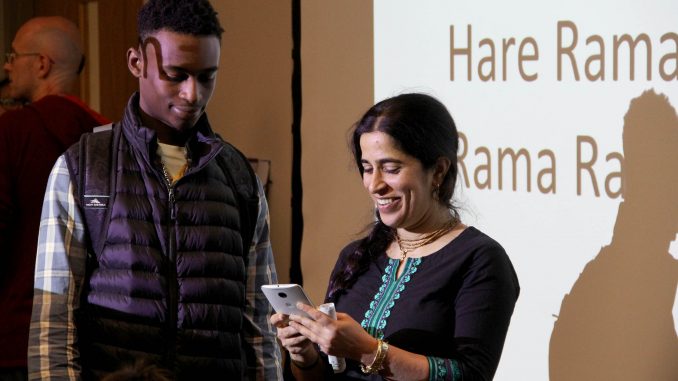
The rhythm of percussion filled the room as the crowd echoed the call and response cry of the ancient Maha Mantra, led by world-famous monk Devamrita Swami.
“Hare Krishna, Hare Krishna,” the crowd chanted in unison as Indian instrumentals played in the background.
This musical group meditation took place at the event “My Mind and I: The Show Must Go On,” hosted by Temple’s Bhakti Yoga Club Oct. 1 in Student Center Room 217B. Swami, who is trained in the Krishna Bhakti tradition, spoke at this event.
Donned in traditional orange swami attire, Swami addressed a crowd of approximately 45 people. He spoke about living a life of simplicity and limiting habit energies, which cause people to focus on material things.
“You won’t be able to get rid of your material wants and needs without taking on superior wants and needs,” Swami said.
The main goal of Bhakti Yoga, Swami said, is to search for a sense of self-realization. Many in the West focus solely on the physical aspect of yoga, which is only one rung on the “yoga ladder,” he said.
Mediation and sonic therapy serve as more essential aspects of yoga. Through these sensory practices, yogis, those who seek enlightenment through yoga, can come to know themselves.
Knowledge is key in trying to achieve self-realization, Swami said.
“To attain the goals of self-realization you have to study, you have to understand through knowledge what is hallucination and what is real,” he said. “And that involves some lifestyle adjustments.”
The philosophy of Bhatki Yoga relies mainly on a spiritual text called the Bhagavad Gita, also known as “The Gita,” to serve as a guide for its teachings. “The Gita” focuses on the accounts of Krishna, who is thought of as the supreme human being in the text.
Because “The Gita” is associated with the Mahabharat, a Hindu scripture, Bhakti Yoga itself is sometimes conflated with Hinduism.
Pratik Dhuvad, treasurer of Bhakti Yoga Club and organizer of this event, stresses that Bhakti Yoga is not necessarily tied to a specific religion.
“You don’t have to be a Hindu or a Muslim or a Buddhist,” said Dhuvad, a graduate student in the physics department. “You could be anyone if you’re looking for like to know who you are, to find peace—that’s what [Bhakti Yoga] is.”
Abi Hesser, a junior philosophy major, attended the Bhakti Yoga Club’s event to try to get a better grasp on how other people in the world were dealing with the pressures of materialism in their own lives.
“I had been thinking about removing [myself] from society, and pretty much everything [Swami] was talking about, the material constraints and pressures of being here,” Hesser said.
She said she wants to incorporate sonic therapy into her own meditation routine, which currently only focuses on breathing patterns.
“I think that his thing with musical therapy, it wasn’t really something that [I’d] ever really thought about as incorporating before,” Hesser said. “[I] never really considered sound therapy as one of the ways that you can sort of heal yourself, so that was really interesting.”
The event concluded with a vegan meal, because food is an integral part of Bhakti Yoga, Dhuvad said.
“Food is something which cleans our consciousness,” Dhuvad said. “It defines us, who we are, that’s why it is very important the food that we eat is very clean.”
Bhakti Yoga emphasizes the virtue of cleanliness, along with those of compassion, austerity and truthfulness as essential in becoming a good yogi.
The Bhakti Yoga Club will continue to help students become good yogis at their bi-weekly meetings, the first of which will be held Oct. 14 at 5 p.m. in Student Center Room 217C.
“Students have so many tensions and anxieties with loans and all,” Dhuvad said. “A main part of this club [is so] they can have resources, so they can set themselves free.”
Jenny Roberts can be reached at jennifer.roberts@temple.edu.


Be the first to comment